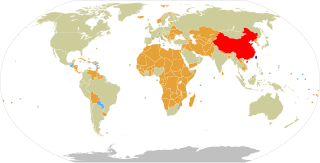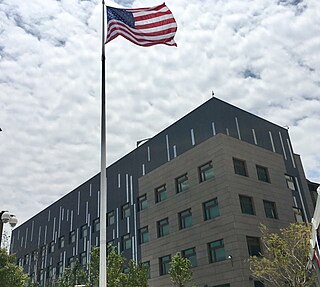Related Research Articles

Foreign relations of the Republic of China (ROC), more commonly known as Taiwan, are accomplished by efforts of the Ministry of Foreign Affairs of the Republic of China, a cabinet-level ministry of the Government of the Republic of China. As of January 2024, the ROC has formal diplomatic relations with 11 of the 193 United Nations member states and with the Holy See, which governs the Vatican City State. In addition to these relations, the ROC also maintains unofficial relations with 59 UN member states, one self-declared state (Somaliland), three territories (Guam, Hong Kong, and Macau), and the European Union via its representative offices and consulates. In 2021, the Government of the Republic of China had the 33rd largest diplomatic network in the world with 110 offices.

The World Health Organization (WHO) is a specialized agency of the United Nations responsible for global public health. It is headquartered in Geneva, Switzerland, and has six regional offices and 150 field offices worldwide. Only sovereign states can participate, and it is the largest intergovernmental health organization at the international level.

Zimbabwe maintains relations with various countries around the world, and maintains close diplomatic relations with neighboring nations.

The American Institute in Taiwan is the de facto embassy of the United States of America in Taiwan. AIT is a wholly owned subsidiary of the federal government of the United States in Taiwan with Congressional oversight. The AIT was officially created as a U.S. government-sponsored nonprofit, private corporation established under the auspices of the U.S. government to serve its interests in Taiwan.

As of May 2024, there are 70 diplomatic missions in Hong Kong, of which 62 are consulates-general and 8 are officially recognised bodies in Hong Kong. As Hong Kong has the status of a Special Administrative Region of the People's Republic of China, some consuls-general in Hong Kong report directly to their respective foreign ministries, rather than to their Embassies in Beijing.

Oceania is, to the People's Republic of China and the Republic of China, a stage for continuous diplomatic competition. The PRC dictates that no state can have diplomatic relations with both the PRC and the ROC. As of 2024, eleven states in Oceania have diplomatic relations with the PRC, and three have diplomatic relations with the ROC. These numbers fluctuate as Pacific Island nations re-evaluate their foreign policies, and occasionally shift diplomatic recognition between Beijing and Taipei. The issue of which "Chinese" government to recognize has become a central theme in the elections of numerous Pacific island nations, and has led to several votes of no-confidence.

China–Lithuanian relations are the bilateral foreign relations between the People's Republic of China (China) and Lithuania. The PRC has a chargé d'affaires in Vilnius. In December 2021, Lithuania closed its embassy in Beijing

China–Netherlands relations officially began in November 1954. In May 1972, diplomatic mission was increased to ambassadorial level. On 11 May 1981, the diplomatic relations was downgraded to the charge d'affaires level due to the Dutch government ratified the construction of two submarines for Taiwan by the Dutch companies. Until 1 February 1984, China and the Netherlands restored ambassadorial diplomatic relations.

Solomon Islands and the People's Republic of China established official diplomatic relations in 2019. Prior to this, Solomon Islands had diplomatic relations with the Republic of China, otherwise known as Taiwan.

Nauru–Taiwan relations are relations between the Republic of Nauru and the Republic of China (Taiwan). Official diplomatic relations were first established in 1980. Relations were first severed in 2003, when Nauru opted to recognize the People's Republic of China. Formal bilateral relations with Nauru were reestablished in 2005, and maintained until 2024.
References
- ↑ China Directory (in Chinese (Taiwan)). Rajio Puresu. 1986.
- ↑ "Mr Boniface Guwa Chidyausiku". United Nations Office for Disarmament Affairs. Archived from the original on 15 January 2024. Retrieved 15 January 2024.
- ↑ "He abandoned law school in pursuit of independence". The Herald (Zimbabwe) . 24 July 2013. Archived from the original on 7 August 2020. Retrieved 15 January 2024.
- ↑ China Directory (in Chinese (Taiwan)). Radiopress. 2008.
- ↑ "Ambassador Paul Chikawa Zimbabwe". Appreciate Africa Network. Archived from the original on 4 June 2017. Retrieved 15 January 2024.